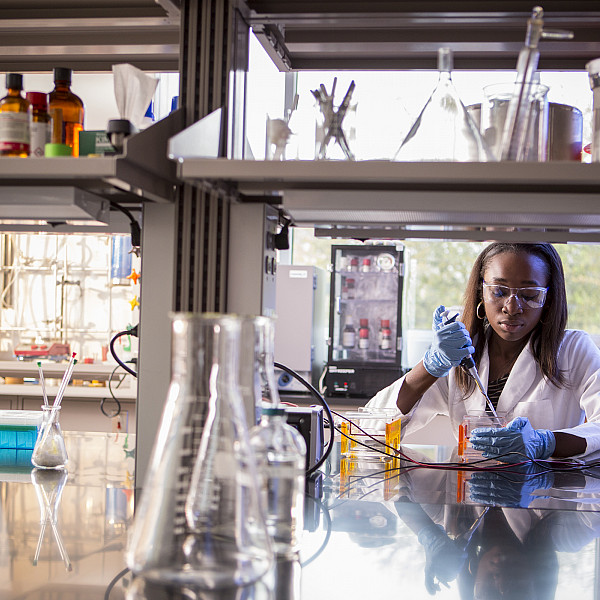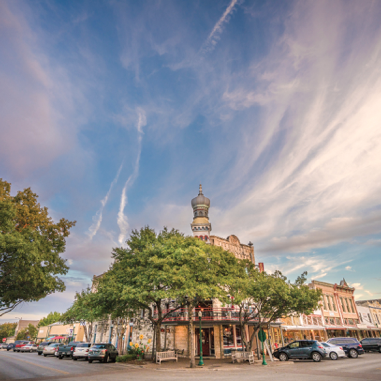News
A Summer Well Spent
November 11, 2020
November 11, 2020
Open gallery

Traits such as confidence, capability, and expertise can be likened to a muscle: to develop, they must be challenged repetitively under ever-escalating stress. At times, we may find ourselves applying for and accepting roles despite being apprehensive about the outcome. While these situations may be uncomfortable, stressful, or flat-out confusing, it’s all part of the learning, and growing, process.
During the summer of 2020, four Southwestern students, under the auspices of the Office of Community-Engaged Learning, completed various placements at The Georgetown Project and Faith in Action Georgetown, two nonprofit organizations devoted to bettering the Georgetown community. Each community-engaged learning student associate (CELSA) went into their internship with different expectations, performed distinctive roles, and came away with diverse knowledge, but what they all had in common was the advancement of their educations, careers, and characters.
Bridging the gap between art and business
Grace Sexton ’22, a business and music double major, reveals that she still isn’t completely sure what she would like to do with her degree. While she is considering arts administration, possibly for theaters, concert venues, and art galleries, the field offers so many possibilities. During her time at Faith in Action Georgetown, a nonprofit that provides services to the senior population in Georgetown, she was able to gain more exposure to a possible career track she may pursue.
Her project consisted of establishing and maintaining a virtual filing system for the organization’s media coverage. Essentially, her job was to accumulate and sort the newspaper articles written about the organization so they could use them for marketing purposes. Working virtually, she had the flexibility to make her own hours and work at her own pace but also kept herself accountable by having weekly meetings with her supervisor, Executive Director Vickie Orcutt. On a normal day, she would go through newspaper databases, read the papers, find the ones which mentioned Faith in Action, and organize them in a useful way. And while she admits that she’s more of a numbers person than a reader, she’s thankful that she was able to learn about the Georgetown community.
One thing Sexton found particularly beneficial was the exposure to a nonprofit business. “A nonprofit’s success is going to look different than a for-profit corporation’s success,” she explains. Since she’s considering arts administration for theaters and concert venues, which are typically nonprofit organizations, it’s important for her to know how a nonprofit functions.
“Don’t be afraid to accept what you’re not good at and learn from the experiences you’re having because that’s the whole point.”
Sexton will be continuing her work with Faith in Action until the end of May 2021 and will be involved in many projects, such as assisting in organizing Faith in Action’s 20th anniversary event and updating client surveys so they are relevant to the COVID-19 pandemic. To students looking for or starting an internship, she advises, “Don’t be afraid to advocate for yourself. Also, don’t be afraid to accept what you’re not good at and learn from the experiences you’re having because that’s the whole point.”
A pleasantly scientific surprise
On the surface, it may look like Megan Melo ’21 picked an odd place to spend her summer, especially considering that her goal is to complete medical school and practice family medicine and primary care. How does a nonprofit relate to her schooling as a biology major and future as a healthcare provider? Well, it relates in more ways than one might think.
For starters, after she completes medical school, Melo hopes to become certified to provide primary care as well as care for pregnant women in underserved areas. In addition, she may want to start her own practice. As a result, her time at Faith in Action Georgetown was a perfect way to become exposed to helping those in need as well as operating in a business setting.
During her time at the nonprofit, Melo was in charge of cleaning up client databases and their online donor management software. Melo explains that as the organization has been using more databases and accumulating more data, they’ve never implemented a consistent way to input information. As a result, running accurate reports is difficult. So her job was to develop a protocol for how to input data as well as ensure the existing data was accurate and consistent with the new method. Again, this task may not seem to be related to her biology major, but she explains that in many of her classes at Southwestern, she focuses on the differentiation between good data and bad data and how useful they may be. Being able to use this knowledge “in a nonscience application was very interesting,” she shares.
Although Melo spent most of her time at a computer during her placement, she was still able to make meaningful connections with the employees at the organization. “There was a really good workplace culture, not necessarily only centered around production but people as well,” she shares. She especially enjoyed interacting with employees who took an interest in the lives of the people around them.
Melo says that an important part of opportunities such as internships is to stay positive in the midst of adversity. “In new environments, it’s easy to get frustrated and overwhelmed,” she reflects, “so reminding yourself that this is an experience for learning can recenter you.”
The teacher who is also taught
Education major and Spanish minor Mariana Quetzeri ’21 played a critical role in Bridges to Growth this past summer. Bridges to Growth is a program within The Georgetown Project that offers language classes for adults who are trying to learn English or Spanish. However, Quetzeri’s role was not confined to the classroom; during her internship, she also created flyers for events. One event she facilitated was the curbside pickup of arts and crafts supplies for the children at Bridges to Growth during the COVID-19 pandemic. Quetzeri explained that since everything was virtual and the children who were normally cared for at Bridges to Growth’s children’s center while their parents were attending classes could not come to the facility as they normally would, the program coordinators had to bring the fun to them. “We would make a video of what they would be doing that week, include all the materials inside a bag, and then they [parents] would pick it up.” She also read to the children during bilingual story time and facilitated the Spanglish Mixer, in which adults learning Spanish or English interact.
Initially, when Quetzeri applied for the placement, she was under the impression that she would be working with preteens, the age group she’s interested in teaching. However, when she later found out that she would be working with adults, she was concerned because she was accustomed to teaching younger students. Nevertheless, she entered her placement excited and ended up loving her experience. One of her favorite memories is that of the Spanglish Mixer she planned, in which students were able to practice their language skills during games such as Would You Rather. Quetzeri was initially skeptical about whether they would like it, but everyone enjoyed it, and she was so excited to see them engaged and interacting with each other. Quetzeri expressed enthusiasm regarding the camaraderie between students which the Spanglish mixer facilitated. “It was really cool to see them interact with each other … . When someone learning Spanish was struggling, the native English speakers would help out, and vice versa. It was really cool seeing them helping each other out and encouraging each other to speak.”
Quetzeri believes that in addition to relying on supervisors and coworkers to help as needed, having fun, being creative, and being open to experiences are important during any sort of internship. That way, she says, you can “connect what you’re learning to what you could do in the future and what you have done in the past.” As an education major, Quetzeri has studied the history of teaching, how to implement available resources in the classroom, and how to write lesson plans. She found that during this internship, she was able to apply a wide variety of these topics, which she says she learned about not just from her SU professors but also from her classmates’ contributions to discussion and their class presentations. This will undoubtedly be helpful this semester, too, as she continues her work at Bridges to Growth and leads a beginner’s Spanish class. Her word of advice for individuals looking for placements is to Quetzeri believes that in addition to relying on supervisors and coworkers to help, having fun, being creative, and being open to experiences are important during any sort of internship so that, she says, you can “connect what you’re learning to what you could do in the future and what you have done in the past.”
Advocating for the whole person
Sarah Johnson ’20 is a communication studies major and anthropology minor who has been working with the Office of Community-Engaged Learning for about a year. Her most recent project was the development of a dashboard for The Georgetown Project that will pull data from a source called The Collaborative, a coalition of organizations and individuals in Georgetown working together to help the youth of the city thrive. Their goal was to make the information easily digestible, accessible, and interactive.
Although her role over the summer was more administrative, in the past, Johnson has been more hands-on, such as while working at the NEST Empowerment Center, a safe haven for children attending school in the Georgetown Independent School District. She greatly enjoyed the role, she says, because “while I was impacting them, they were also impacting me.”
Both of Johnson’s CELSA experiences have been invaluable as she has begun her work as a court-appointed special advocate volunteer for children in foster care. In the future, she hopes to pursue child advocacy law. While she feels that her work in the community has been different from anything she’s done in her classes at Southwestern, she says her work at The Georgetown Project has correlated with what she has learned in her coursework in multiple ways. For example, she was able to compare certain business aspects of the organization to her study of communication, such as how to market a product. But her anthropology classes have also taught her that you have to view someone as a holistic person. “You have to take into account all their life experiences,” Johnson reflects, “and that’s what makes their perspectives unique and them them.”
















